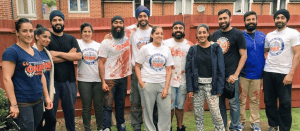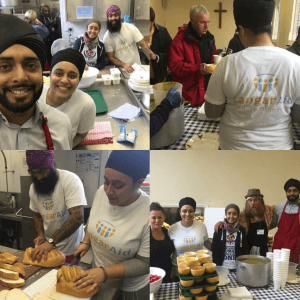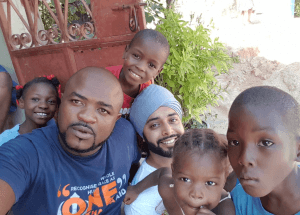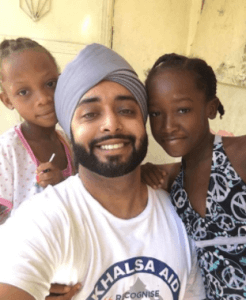
My first volunteering day painting fences at an elderly home in Berkshire, autumn of 2015.
How did you get involved with Khalsa Aid?
Hi, my name is Jymit Singh Khondhu. I became a volunteer with Khalsa Aid in early 2015, starting with an open day of 50+ new volunteers hearing from the NGO themselves, including Ravi Singh who started KA in 1999 and we were given the history, the past projects and how we could best contribute, from the variety of locations around England us volunteers came from that day. We got to meet and talk with the trustees, hear from those that have been on the front line and more so on relief programmes in and around London and wider England. More on the past and present projects here, https://www.khalsaaid.org/projects
One noteworthy story here about the fella with the beard and the hat standing to my left in the bottom right image.

Feeding the homeless 2015 during lunch at Chelsea Methodist church.
He himself is homeless and through coming to the church and volunteering himself, he finds calm and understanding behind helping his fellow brothers. In many respects he reminded me of an uncle of mine who is no longer here, and we became friends and we recognised each other when we met after that day. That was a nice connection made.
Notably cooking and serving at the same Methodist church Christmas eve of 2016. It was a success and we even had a couple volunteers singing Christmas carols.
Fast forward to 2017, I have partaken in and raised money towards a hike up Snowdon in June, marshalling a 5k charity run in Hyde park in August and recently the chance to go to Haiti to provide continual earthquake relief in October.
Tell us about your recent trip to Haiti — what was the reason?
I have always wanted to do charity work abroad so when I heard from Khalsa aid of the dates I jumped at the chance. Where I work we are granted 5 days paid leave that we can use towards charity work, so this synced up really well.
The 2010 Haiti earthquake was catastrophic with a magnitude of 7.0 Mw. It’s epicenter near the town of Léogâne (Ouest) which is approximately 25 kilometres (16 mi) west of Port-au-Prince, Haiti’s capital. Devastatingly leaving 220,000 people dead, destroyed 50% of the schools and adversely affected over 3,500,000 people.
Khalsa Aid partnered with United Haitians in the UK (UHUK) to provide much needed humanitarian aid in the region. Khalsa Aid has established an official operation center from a disused clothes factory for all international NGOs to setup and efficiently coördinate relief operations.
Due to the strong links built with local communities Khalsa Aid sponsors now 9 almost 10 orphanages, circa 700 children and have provided support for the last 7 years.

Our local Khalsa Aid man on the ground who is born and bred in Haiti, Marcsan Balan, pictured in the blue and myself in the white T‑shirts, at one orphanage we grew to call ‘the mountain one’.
The reason for my trip to Haiti was to provide the continual supplies post the earthquake. Khalsa Aid go out to Haiti every 3 to 4 months to meet with 9 orphanges we provide supplies to, talk to the members running the orphanages, spend time with the children who are not just homeless due to the earthquake but because family cannot simply afford to support them.
Providing a smile, playing games with the children and something as simple as given them a hug and showing some love goes a long way, and it did.
How was reality out there in comparison to what you had seen via media?
I don’t feel that post the earthquake much has been covered in day to day media about the poorer and impacted parts of Haiti. That said Haiti remains the poorest country in the Americas and one of the poorest in the world. I note that the media are more likely to have coverage of the capital, Port-au-Prince and the affairs of the government and state.
So by going out to one of the poorest countries in the world and being able to see first-hand the orphanages, the streets, the markets, the day to day living of the country and its people was eye opening. I saw, held and took time to talk (given my limited to none French and Creole) with babies and children from the ages of 1 years old up to 18, boys and girls across the 9 orphanages we support. The reality and the one word that stuck in my mind was gratitude. A lot of the impacted areas and people were living outdoors or in huts, with very little to eat and no clean water. This was seen coming out of the airport at Port-au-Prince all the way west down to Léogâne.
I wasn’t one that had travelled to poor countries before so this was a first. The reality was eye opening and emotional. The continual thoughts were how I could do more as an individual. What could I do in the long run in Haiti and what could I do in my life in the long run for the wider impacted areas around the world? I want to help, I feel it is a part of my being and story in the long term, opposed to being sat behind an office desk.
What life lessons have you learnt from these trips?
Gratitude and appreciation for whom you have in your life and what you have. It really is the small things that count and life is short.
Seeing children having the most fun with a football or a stick means so much more than material objects. This trip was just a reiteration on the basics we grew up on and a reminder to stay grounded.

How in your personal life here in UK do you try to make a difference to society?
Now not just due to my Sikh upbringing but more so what I feel is part of my path in life, I enjoy giving and being a part of the bigger movement in life and helping those in need. Being able to be a part of Khalsa Aid and more so the project out in Haiti, I want to do more and on a regular frequency. Whether that is local to where I reside, not just during festive times and times of bitter weather but continually. Perhaps use my work holidays for something more live fulfilling and rewarding. I know that for my birthdays and days such as Christmas where I rather be and what I rather be doing. Helping those less fortunate. In the longer spectrum of things, we, people, everyone in general are stronger as a collective and not small segregated groups.
What differences can we make in our daily lives as a collective?
Now this is just from my own ideology but less waste of food and plastics goes a long way. If we have a roof over us, clean water and ample food to sustain us twice over, then we are spoilt. I believe you don’t need to be a part of something or a collective to be nice or to give. We should always seek to bring a smile to our brothers and sisters we walk past day to day. 1. It may really go along way and 2. giving makes your own body or soul a happier place. It gives you a feeling of completion and joy. Happiness is seeing others smile.
What would you say was the most challenging part of your trip?
I had this one particular exchange with Marcsan who lives and still resides in the impacted part of Haiti. Marcsan has been working with Khalsa Aid since 2010 and as we go out their every 3 to 4 months, he is pivotal to translating French Creole to English as well as talking with suppliers and resourcing the best suppliers we then purchase and share out to the orphanages.
When we are out in Haiti, we take care of rental of vehicles, petrol, supplies and food, etc. On this one particular early afternoon, Marcsan turned to us and asked “Can I have some water”. Just hearing that alone made me very emotional. That something simple for us back home to walk up to a faucet and pour some water into a glass, is being asked for.
The challenges I myself faced were seeing those less fortunate wanted to give what little they had. For example, on return to one of the poorest orphanages Khalsa Aid support, we were met with the children running up to us with a fist in their hand as a sign of appreciation and thanks for the supplies we have earlier in that day dropped of. Supplies such as rice, pinto beans, tomato tins, milk, sanitary supplies, baby food, washing up powder, etc. On return to this particular orphanage, a child ran up to me and put in my hand a handmade string wristband with a Haiti flag emblem in the centre. I was like no way, 1. Earlier that day I was thinking about what could I buy to remind me of my special trip out here and 2. I was emotional at the thought that these young kids had spent their day making this, they have nothing and live in a shack with a tent roof, beds made of wood and very little supplies. This trip was full of so much giving. It was nice to feel the love from all the children during my time in Haiti. It is something that will stay with me forever.
Future trips ?
At present I have no future voluntary trips planned with Khalsa Aid. I am aware of the projects they have out in Malawi due to water shortages, Nepal due to the earthquake and more recently the hurricane affected islands of the Caribbean.
If I get the chance to go out to any other projects, I deem it as a blessing being able to help those in need and really stand behind the ethos of Khalsa aid that we recognise the whole human face as one.
Im still raising money for the Haiti trip gone, please find the link here, https://www.justgiving.com/fundraising/jymitkhondhu
Rishma
Latest posts by Rishma (see all)
- MEET THE FOUNDER | REBECCA MCCARTHY TALKS TO US ABOUT KNUCKLE GLOSS — January 19, 2026
- NEW MUSIC | FRSHRZ RELEASE NEW PROJECT ‘REMIXTAPE 3’ — January 8, 2026
- NEW MUSIC | TRUEMENDOUS & TONY BONES RELEASE EP ‘NO ROUND OF APPLAUSE’ — January 8, 2026
